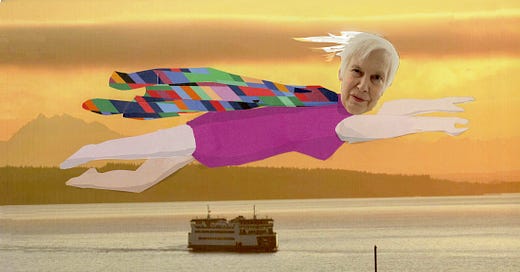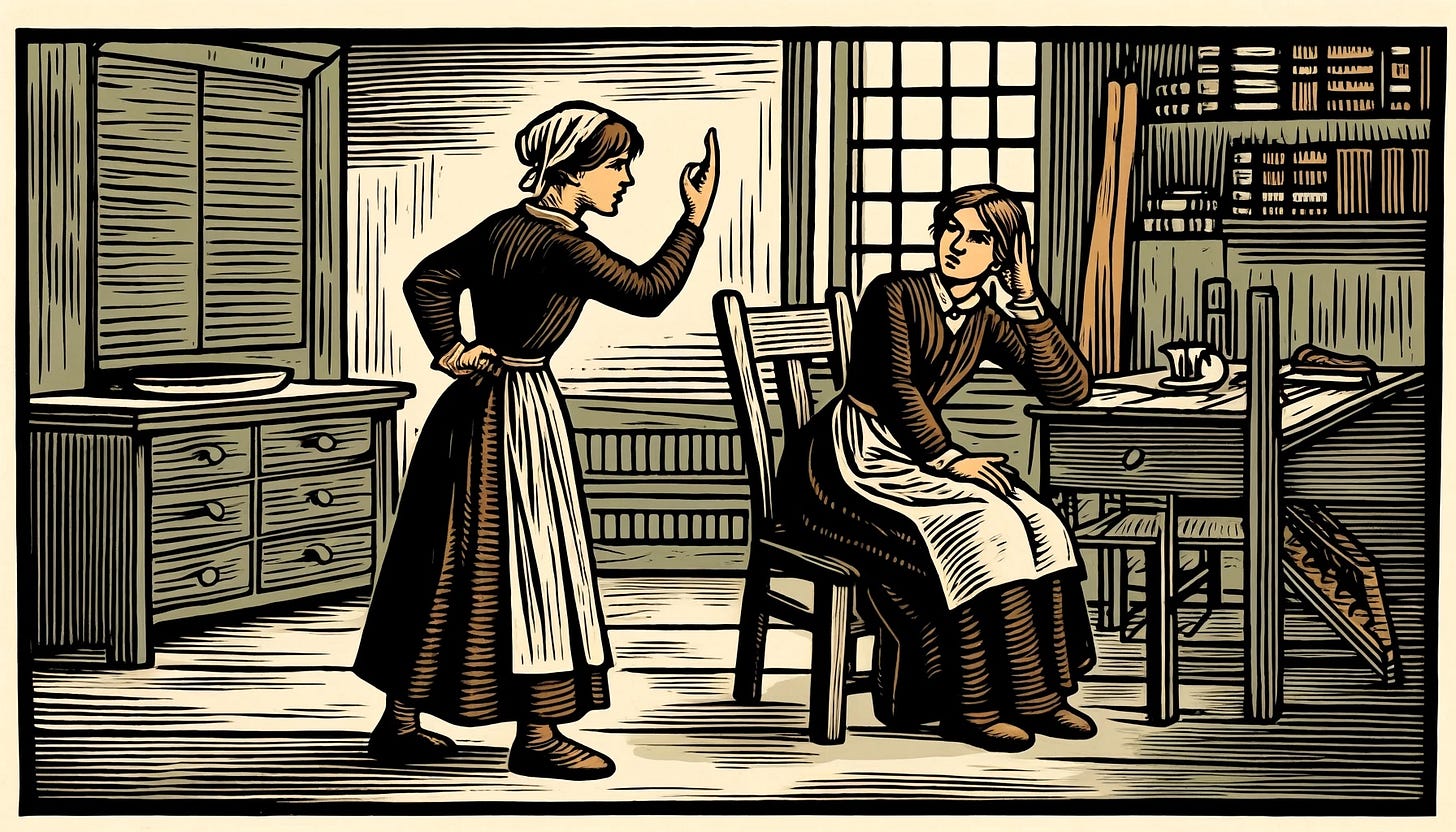PERSONAL JOURNALS
On her open-heart surgery
I WAS SITTING in my living room in San Francisco in May, 1983, when Barbara first announced herself in her inimitable way. As she walked through the door, unexpectedly, with a mutual friend from Seattle, she said, "Hi, you don't know me, but I'm here to crash." Her energetic, cheerful entrance cut through the dark fog that hung over that apartment and my life in those days. Scanning the room, her eyes then landed on my stack of blues records. "Bobby Blue Bland!" she said, pointing to His California Album on top.
As she now struggles to recover from a radical surgery a month ago, a song from that album has been looping through my mind. "It may be nice and warm today. Tomorrow may be drizzled and cold," he sings in Up and Down World—a fitting title for the past three months. The song is about the end of a relationship, but on that long-ago evening, unbeknownst to both of us, ours was just beginning.
Yesterday, we shared that we had both reflected on our beginnings and the contrast between those enthusiastic young lovers and our life now that we face the undeniable reality of our vulnerable and unreliable bodies. I believe that in a couple of months she will regain or even surpass the energy and vitality that an occluded channel in her heart had sapped. I also believe—finding her near lifeless in the ICU a month ago, surrounded by tubes and monitors —that I've seen our deaths foretold.
But not today.
On my surgery and recovery
By Barbara Ramsey
BEFORE MY SURGERY, I was told to expect a three to five-day hospitalization. It turned out to be fifteen days.
Before my surgery, I was told to expect some chest pain. After surgery, I found they couldn't keep my blood pressure high enough to perfuse my brain, which made me a little—or was it a lot?—crazy. I discovered my left vocal cord was paralyzed, which meant my voice was barely a whisper and I risked choking to death every time I took a bite of food or drink of water. I had crampy abdominal pain associated with bouts of explosive diarrhea (apologies to the squeamish). I gained eighteen pounds of fluid in three days, necessitating the use of powerful diuretics that I knew could either save my life or kill me.
Before my surgery, I'd rarely felt sad. In the days following, I sometimes felt suicidal.
Before my surgery, my biggest medical procedure had been a tooth removal. (Don't laugh! It really hurt). After surgery, I laid in the ICU with a huge IV sticking out of my neck, two separate large bore tubes protruding from my chest, two peripheral IV's (one in each arm), and a tube coming out of my bladder. I had gone from an interesting older woman with a talent for witty remarks to a seriously disabled two-year-old who was not yet potty trained.
On the bright side, I was getting some of the best medical care on the planet. I still had a loving husband and devoted sisters. And many of my friends sent me love and hope and promises of homemade food once I was out of the hospital.
The most dazzling lights in my hospital world were a hospital chaplain named Trina, three Ethiopian nurses' aides named Azeb, Cal, and Lem-lem (possibly the kindest people on the planet), and a nurse named Liz (who teaches art to children in her spare time). They gave me reason to live. My main surgeon, Dr. Lara Oyetunji, a tall Nigerian woman with the arms of a linebacker, made it possible for me to live. Laying in my hospital bed, I craved both life and reasons to live it. Life alone is a pale, squirming thing in search of calories. Our reasons for living are as beautiful as the glowing nebulae seen by the James Webb telescope.
ON LANGUAGE
Taking umbrage
By Barbara Ramsey
I LOVE THE word “umbrage”. The first time I ever used it (albeit just in my head, not out loud), I was working out by myself in an exercise studio one evening when another woman came into the room and started her routine. I’d seen her around the studio several times but had never had a conversation with her, just hello and good-bye. I tried to start up some small talk and asked her if she’d had a good day. “Well,” she sniffed, “Whatever kind of day I’ve had, it certainly isn’t any of your business.” All of a sudden it seized me: She was taking umbrage at my remark! She was an umbrage taker!
The literal meaning of the word is offense or annoyance, as in “He took umbrage at her impudence.” And although being offended is a hallmark of the human, we have surprisingly few words for it. Besides offense and umbrage, there are no other one-word synonyms that come very close. “Annoyance” isn’t good. It’s too general, too vague. “Irritation” is worse. I once heard a biologist say that “Irritation is the hallmark of cellular life. If you can irritate it, then it’s alive”.
We need more specific ways to describe this all-too-human sensation. “Personal displeasure” is awfully good. It conveys the feeling that whatever the offending matter, it’s coming in close, getting personal. I also like “sense of injury” as it contains the idea that one doesn’t actually need to be injured, one can merely perceive injury. This is crucial. The person being offended is the judge here. Unlike an injury that can be detected with an x-ray, offense is a subjective matter.
Like all subjective matters, disagreements arise. What causes me to take umbrage may strike you as amusing. For those who crave the blood sport of being offended, taking umbrage can create a thrill of self-righteousness. For others, being offended is an energy drain to be avoided.
There’s another curious thing about both umbrage and offense. The verbs that go with them are “give” and “take.” We give umbrage and we take umbrage. The “give” part seems plain enough but what about the “take”? Aha! This is where it gets interesting. “Take” can be defined as “to get into one’s possession by voluntary action.” Note the voluntary part. For some, taking umbrage doesn’t feel like a voluntary action at all. They may be taking it automatically without their volition. For others, umbrage may be lying around but they don’t feel the desire to take it. They’re perfectly happy to leave it lie.
The first use of umbrage in the fully modern sense is found in the early 17th century where it was used to mean the “suspicion that one has been slighted”. Again there’s the subjective sense, where “suspicion” clearly implies an unstable type of perception. Suspicions are sometimes well founded and other times mere paranoia. When we take umbrage, we may be basing our sense of offense on a perception that’s not entirely trustworthy.
What about etymology? What is the root origin of this word? “Umbrage” is thought to have entered the English language sometime in the early 15th century from the French word ombrage, meaning shade or shadow. Deeper origins are in the Latin umbraticum, “of or pertaining to shade.” The root of umbrage links it to words such as umber (a color like ochre but darker = a shade of ocher), umbrella (a canopy of cloth that creates shade and protects against sun or rain), and penumbra (the partially shaded outer region of a shadow; the shadow cast by the earth or moon over an area experiencing a partial eclipse).
Which brings me to a curiously modern phrase, “to throw shade,” meaning to criticize someone, to hold them up to ridicule. Sounds awfully much like giving umbrage to me! Imagine that—a relatively obscure word from a Latin root given to English via French in the early 15th century somehow jumps up into the mouths of 21st century kids speaking the latest vernacular. Makes me happy.
BIRDS

SCIENCE WRITER Ed Yong recently contributed an essay to the New York Times that is one of the more vivid and evocative descriptions of the experience of watching birds that I’ve read. Yong befriended a local bird expert here in Port Townsend, Stephen Hampton, who has been a leader of the charge to change bird names, some of which are attached to questionable historical figures. In response, the American Ornithological Society announced in November that it would change all bird designations in English that are named after people. But the name for the Yellowlegs, like the one seen above, will stick.
FOR THE LOVE OF TYPE
THIS PAGE COMES from a 17th century German book of calligraphy. The letters therein have more swirls than a whirling dervish and more swashes than a Caribbean pirate. I wager they are illegible to most readers. I’ve turned this letter on its side to get all the swirls in the frame, but identifying it remains a challenge at any angle. I’m guessing a “Q”. The book is titled with flourish as well: The Proper Art of Writing: a compilation of all sorts of capital or initial letters of German, Latin and Italian fonts from different masters of the noble art of writing. I have to wonder at the size of the paper and the number of attempts to create such a remarkable effect with a mere quill.
Snippet of the week
I WAS MOVED by a call from jazz musician and critic Ted Gioia for a revival of the humanities, which he believes will and must happen outside the academy. In “The real crisis in the humanities isn’t happening in the classroom,” he describes what he calls eight imperatives, quoted below:
We need a way of defining and pursuing progress that doesn’t reduce that concept to something that only comes from a digital device.
We desperately need access to values and wisdom that aren’t corrupted by the relentless financial metrics and imposed flavor-of-the-month narratives of the current moment.
We need to instill a respect for human beings, whose physical and psychic health should come ahead of the accelerated scalability of corporate bots.
We need to address the growing human crisis—witnessed by a frightening increase in mental illness, cases of depression, suicidal tendencies, etc.—with a human response, instead of ramping up the tech that is demonstrably adding to these problems.
We need to provide the young, who are especially vulnerable to these dysfunctional technologies, with some bedrock of values and practices that will nurture their potential as human beings, not captured tech clients.
We need to learn from the past, and the thousands of years of accumulated wisdom it can provide—something that is only accessible via the humanities.
We need to preserve and celebrate core human values in the face of metrics that want to reduce every initiative, every decision to optimization of the numbers.
We need to propagate a compassionate, humanistic worldview, not a private equity mindset in which every human activity is squeezed to maximize cash flow and support the luxury lifestyles of the technocracy.









I don't know if Barbara wrote the "umbrage piece" before or after surgery, but she nails it! I love when words come to life, especially our favorite ones.
Kerry, the photo of the Yellowlegs is exquisite. Seeing clearly his eponymous (a word that gives _me_ tingles) appendages in his own reflection is perfection.
Continued healthy recovery Barbara. Thank you for sharing.
Loved this piece and praying that all goes well for you both; as a Humanities Major, I appreciate the appreciation for the disciplin🙏